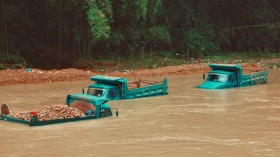A new study published in the journal Science reveals that climate change's impact on biodiversity will be severe in other regions of the world, not just in the popularly cited polar ice caps.
Shrinking ice sheets and melting ice caps are not the only consequences of climate change. Research from the University of Copenhagen and the CSIC National Museum of Natural Sciences in Madrid suggests that the tropics, for example, will be highly affected by local changes in temperature and precipitation, leading to inimitable climates.
"Whether species will be able to adapt to these novel climates is an open question. There is a risk of neglecting such vital information because the temperature increase in the polar regions is easier to grasp in comparison," senior author Miguel Araújo said in a press release.
This international study is the first of its kind to assess in detail the threats and opportunities for biodiversity arising due to climate change.
"We can measure whether extreme events will become more or less extreme, whether given climatic conditions will become more or less available, and how far climatic conditions will move from their current locations," noted researcher Raquel Garcia from the CSIC National Museum of Natural Sciences in Madrid.
The team used 15 climate change models used by the International Panel for Climate Change to analyze how changes in temperature and precipitation could affect different species worldwide.
"Polar climates will shrink in area, providing reduced habitat for arctic and subarctic species, but climate change is more than melting ice," Araújo said.
Garcia added: "Extreme warming and drying events, for example, are projected to mainly affect the tropics, causing a severe threat for sensitive species."
Even though the threat is realized, one cure does not fit all.
"Although climate change is a global phenomenon, it is expressed in many different ways, varying from region to region and thus there is no single cure to apply to all areas," co-author Carsten Rahbek said. "The good news is that the better we understand the implications of climate change, the better we can design management actions to preserve biodiversity and ecosystems."
© 2024 NatureWorldNews.com All rights reserved. Do not reproduce without permission.





